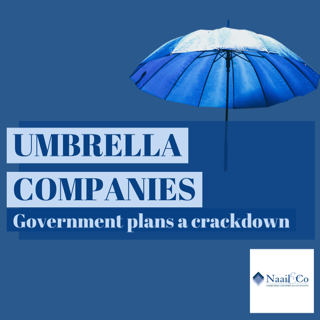Government plans crackdown on
UMBRELLA COMPANIES
The Treasury is seeking input on how to improve protection for contractors that utilise umbrella businesses by establishing a legal framework and examining the procedures for paying employees and tax obligations.
There are widespread worries that independent contractors are being tricked into joining umbrella businesses and frequently receive harsh tax bills as a result of third party agents’ non-compliance, which costs the UK some £400 million annually.
Although the government rejected proposals to outright prohibit umbrella companies, saying that such a move would not be a “proportionate response,” stricter legislation will be enacted to control the industry.
Typically, while employees work for the clients of the agency, the umbrella firm hires people and pays their salary via the PAYE system. Up to 1.7 million temporary employees are thought to be employed in the UK, and many of them find work through employment intermediaries.
In order to ensure that the agencies are protected by any applicable laws, the consultation considers options to govern the umbrella company market by giving them a legal foundation and a precise description. Additionally, it contemplates expanding workers’ employment rights as well as countermeasures against noncompliance including required due diligence.
The introduction of a mandatory due diligence requirement would be supported by penalties applying to those employment businesses or end clients that do not comply. This requirement could sit with the employment business or the end client depending on the specific arrangements of the contract.
It is also considering whether to legislate to give HMRC the power to collect an umbrella company’s tax debt from another business in the labour supply chain, in specified circumstances. This would primarily apply to outstanding amounts of income tax and National Insurance contributions (NICs) that should have been collected via PAYE.
The most drastic strategy is to shift PAYE responsibility to the contracting employer. This alternative “would deem the employment business that supplies the worker to the end client to be the employer for tax purposes,” according to the consultation. This solution would necessitate operating PAYE on payments to contingent workers’ by a company further along the labour supply chain.
The employment business would be held responsible for ensuring that the prohibition on other models of employment or engagement and payment were adhered to, but would allow a potential due diligence defence where they can demonstrate they have taken all reasonable steps to ensure that the permitted method of engagement was being used. It is likely that the government would authorise the Employment Agency Standards (EAS) Inspectorate to regulate umbrella companies as it already has powers of enforcement and can make onsite visits to those covered by its remit.
It has also proposed options for a set of minimum standards, to be put into statute, covering the handling of pay and holiday pay, charging of fees for additional services, and the umbrella company’s role in the supply chain.
The government is considering further action to combat the abuse of the £5,000 annual employment allowance and the VAT flat rate scheme, which are both abused by umbrella companies. One of the ideas is to require that a UK director has to be in place for a company to be eligible for the employment allowance.
There are concerns from stakeholders in the industry about the risks that abuse of the umbrella company model can pose with companies ‘skimming’ wages with extra deductions, correct amounts of National Insurance or income tax due not being paid, and staff not being paid the holiday pay they are entitled to.
Victoria Atkins, financial secretary to the Treasury, said: ‘Umbrella companies play an important role in our labour market but it is important that we protect employees from any potential abuses of the current system.
‘This consultation sets out a number of potential measures which could help both employers and employees and I encourage anyone with a stake in this industry to make sure their voice is heard.’
The consultation will close on Tuesday, 29 August 2023.
Treasury consultation, Tackling non-compliance in the umbrella company market

Our service to you
If you are a self employed, business owner/director of company looking to get your accountancy and taxation matters sorted, look no further. We, at Naail & Co, are pro-active and easily accessible tax advisors and accountants in London, who will not only ensure that all your filing obligations are up to date with Companies House and HMRC, but also you do not pay a penny more in taxes than you have to. We work on a fixed fee basis and provide same day response to all your phone and email enquiries. We will also allocate a designated accounts manager who would have better understanding of your and business financial and taxation affairs. Book a free consultation call with one of the leading accounting firms in London using the link below.
Related pages:
Get further information on our small business accounting services from the following pages;
Related Blogs:
Get further information from the following blogs;
Dividend or Bonus, What’s more tax effecient?
Create an income from directors loan account
Tax tips for directors to be actioned before end of financial year
Inheritance tax planning for main residence
Inheritance tax: Gifts for maintenance of family
Subscribe to our newsletter
BUSINESS HOURS
Monday – Friday
- 9:00 am – 5:30 pm
Pages:
Menu








